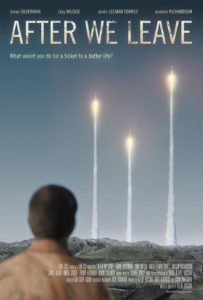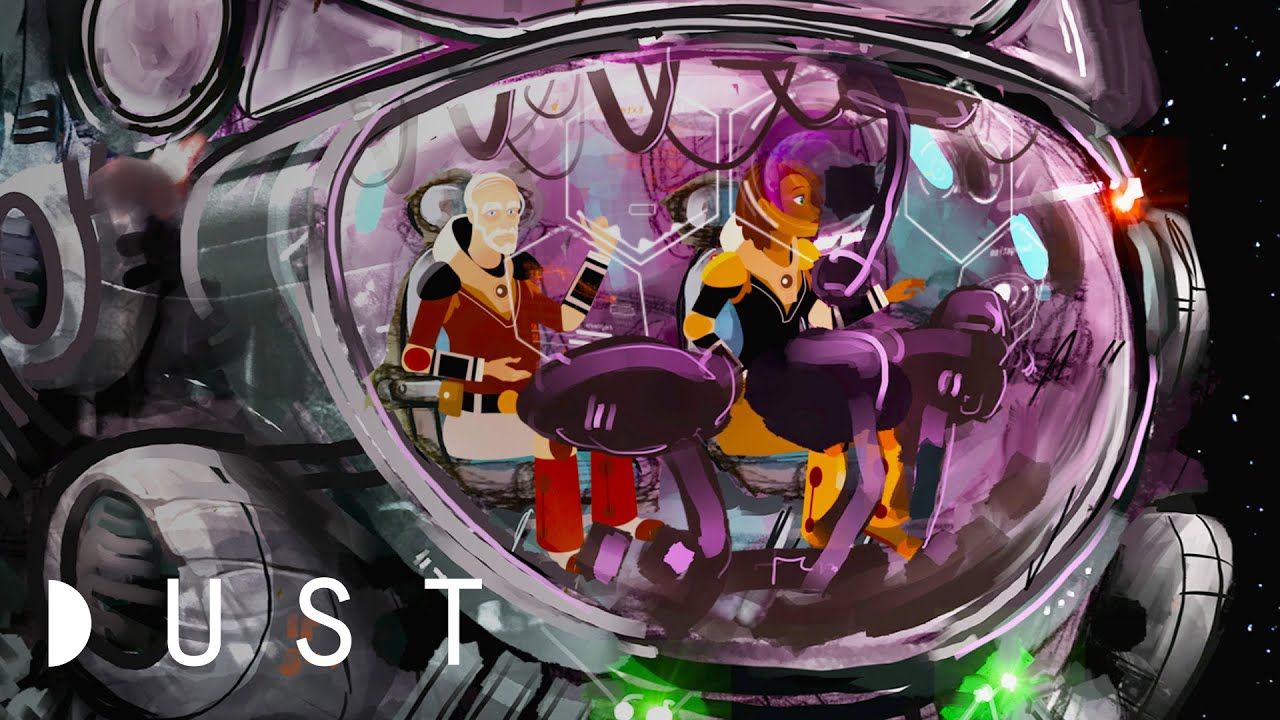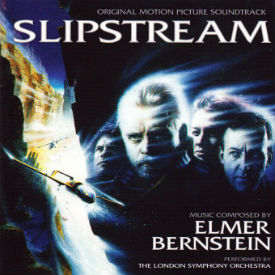What would you do for a ticket to a better life? That’s the question at the heart of the award-winning sci-fi indie film AFTER WE LEAVE by director Aleem Hossain. AFTER WE LEAVE recently made its North American premiere at the well-known Other Worlds Film Festival in Austin, TX, after winning best feature film at Sci-Fi London earlier in the year. It’s expected to screen in Hollywood in February 2020. We spoke with Aleem Hossain about his filmmaking experiences and what inspired his film.
RECURSOR: Tell us a little about your background.
ALEEM HOSSAIN: My father is a Muslim immigrant from Bangladesh. My mother is a white woman from a big Spanish and Italian Roman Catholic family in Connecticut. And these two people got married in 1972, only five years after the Supreme Court ruled that interracial marriage had to be legal. All of which is to say that I’m a mixed-race American.
The story of my parents’ relationship is built on a shared belief and respect for a single idea: “There’s more than one way to do things.” And if there’s a throughline in my work as a filmmaker, it’s an exploration of that idea.
How did you become interested in making films?
My parents are huge movie fans. I grew up watching Bollywood musicals, Spielberg blockbusters, and European art house cinema. Something about watching that many different cinematic traditions lit a fire inside me to create my own films. I was blown away by all the things cinema could be.
Who/what are some of your favorite science fiction films/artists?
As a kid, I devoured the short stories and novels of Isaac Asimov, Orson Scott Card, and Octavia Butler and watched every episode of the original STAR TREK I could get my hands on.

But the three films that made me want to create sci-fi films myself are Kubrick’s 2001, Tarkovsky’s STALKER, and Carruth’s PRIMER. 2001 and STALKER taught me that watching a sci-fi film could be a profound experience. I saw them both on 35mm film at DOC films at the University of Chicago and left the theater each time in an altered state, the thoughts in my head temporarily leaving behind the verbal and becoming only sounds and colors and images.
When I was in film school, I saw PRIMER and I realized it was the film I’d been waiting for without realizing it: a sci-fi film that trusted its audience to figure things out. A film that iterated a familiar genre and used it to comment on the human condition. It had been made for $7,000 and was the best movie that came out that year. I saw that film and knew that I was going to make a sci-fi feature.
What inspired the story in AFTER WE LEAVE?
First, I wanted to see if it was possible to combine the raw but poetic feel of recent indie crime dramas like WINTER’S BONE with sci-fi.
Second, I think one of sci-fi’s greatest strengths is the way it can offer a new way of looking at life right now. The future America we see in AFTER WE LEAVE emerged from the stories my Bangladeshi relatives tell me about the legal immigration process to the U.S. from Bangladesh, where visas are like lotto tickets and can wreak havoc in people’s lives.
Third, I had one of those creative flashes one day sitting in traffic on Wilshire Blvd. A man’s face appeared in my mind. I knew he was looking at someone, and the question that arose in my brain was: Has he changed? I didn’t know what that meant yet, but it was the start of creating Jack Chaney, the lead character in AFTER WE LEAVE. As I started writing Jack’s story, I realized I was frustrated with other cinematic depictions of very flawed men who somehow achieve huge personal change and are then rewarded in the narrative. I wanted to make a story that reflected my belief about the extent to which people can change and what the results of that change really can be.
How did you create a futuristic feel on a tight, $30K budget?
The primary way I created the future world was not through VFX but through location scouting and framing. Between 80 to 90 percent of what you see in the film was actually there in front of the camera. I scoured Google Street View for hours on end to find places I could piece together to create my decaying, water-starved, permanent recession vision of Los Angeles. There are some scenes where even the shot-reverse-shot in a dialogue scene are in two different parts of the city. VFX adds a very important final layer to the future landscape.

My brother, an accomplished VFX artist, and I had been experimenting for years with ways to bring down the cost of VFX and how to integrate VFX into guerilla style filmmaking. The truth is, VFX have become easier and cheaper than ever before. This doesn’t make them easy to do, but I think more filmmakers should dare to dream to use them. Everything you see in this film was shot on a DSLR or created with Adobe Premiere and After Effects. With the right preparation and approach to shooting, VFX can be used in even small indie films.
How else did you stick to your budget? Any tips for other filmmakers?
I think the biggest mistake many of us make as indie filmmakers, myself included, is to mimic the Hollywood model of production and just scale it down for our budget. I’ve come to believe this is a terrible idea if you want to make a true piece of indie cinema.
The dominant model of production is an unbroken sprint of long work days. The central tenet, the first commandment of Hollywood, is: Stay on schedule or else. This model encourages everyone to play it safe artistically.
I don’t want to have “play it safe” be my motto on set. So I was really motivated to try something different.
We decided we would spend as little money as possible, shoot incrementally in between our paying gigs, with a very small crew, and with equipment we owned. That way, we wouldn’t care if the day was wasted, and we could try out the crazy performance ideas or hard to execute shots or steal locations we didn’t have permits for. We would avoid the budget/time pressure that leads low-budget filmmakers to make safe choices, to shoot simple standard coverage because it’s quicker, or to avoid experimenting.
I wanted to do a sci-fi drama where some scenes were improvised. I told my actors that they could always have one more take. I told my brilliant DP Julie Kirkwood we would shoot only during the hours of the day when she liked the light.
We shot the film over a four-year period. There were days when we got up to catch the sunrise for one shot and then all went to our various jobs and other projects. There were weekends where we shot non-stop for two days straight, running all over LA to steal one interesting location after another. We got harassed by private security guards, rather nicely talked to by the police, and more than once had strangers volunteer to be in the background of shots. I told everyone that on some days we might just get a single shot, or shoot a whole scene that we might throw out and do again. The only cost was time and what we gained was artistic freedom.

Tell us what it’s been like to show the film at festivals.
I spent a long time working on AFTER WE LEAVE. At a certain point, I forgot that people would actually see the film. So I had this moment, sitting in the theater in London a few minutes before showtime, where it suddenly hit me: Oh man, people are going to watch my film…and have thoughts and feelings about it. And just as that feeling of anxiety was washing over me, the film started.
When the lights came up and it was time for the Q&A, I felt differently. Now, having just experienced the film myself, I was thinking: Oh man, I’m excited to hear what people think and feel about the film. About halfway through the Q&A, five or six audience members were engaged in a healthy debate about the end of the movie, with me just sort of watching, and that’s something I really love about festivals.
You’re currently developing YOU ARE FOREVER, YOU ARE EVERYONE, an interactive narrative sci-fi VR experience with the support of the Tribeca Film Institute. Can you tell us anything about it?
That project is still in the R&D phase, but it is part of my recent efforts to think about how to use AR/VR to tell fictional stories and as a vehicle for autobiographical narratives. The Tribeca Film Institute is an amazing institution, there are so many projects out in the world right now that wouldn’t exist without their support, and it has been really gratifying to know that they believe in my work.
How can people connect with you?
If aspiring filmmakers want to hear more about my approach to independent guerrilla production, or if any cinephiles out there want to hear my thoughts on indie sci-fi and diversity in genre films, they can sign up for my newsletter at www.aleemhossain.com/get-email-newsletter.
Film fans may not realize it, but seemingly trivial things like following someone on social media or signing up for a newsletter are actually real ways of supporting artists. Every distributor I talked to when we were selling AFTER WE LEAVE asked questions about how many people followed me on Twitter or Instagram or subscribed to my newsletter. It’s an easy way you can help those creators make more art.
Aleem Hossain is a film writer-director, virtual reality creator, and assistant professor of Digital Storytelling at Occidental College. He was selected for the initial Oculus Launchpad program run by Facebook/Oculus, where he developed his ongoing documentary VR series I NEVER TOLD YOU. He was a 2017 artist-in-residence at the VR Action Lab where he created NO EASY ANSWERS, a VR anti-bullying project, in collaboration with Google, Harmony Labs, and Screenwriters Colony. He is currently developing YOU ARE FOREVER, YOU ARE EVERYONE, an interactive narrative sci-fi VR experience with the support of the Tribeca Film Institute.










